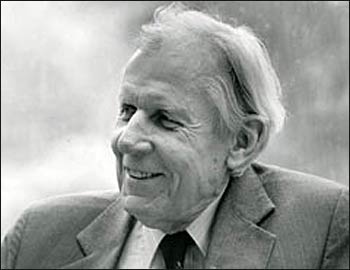By Paul Chaffee
EDITORIAL
Lynn White, Jr., a distinguished historian at UCLA, published “The Historical Roots of Our Ecological Crisis” in the March 1967 issue of Science. In it he takes aim at Judaism and Christianity for promoting the degradation of the Earth and its living creatures.
The 28th verse of the first chapter of the Bible reads, “God said to them, ‘Be fruitful and multiply, and fill the earth and subdue it; and have dominion over the fish of the sea and over the birds of the air and over every living thing that moves upon the earth’” (NRSV). Dominion has led to domination and subduing to degradation, White argues, particularly when the “image of God” is found linked to humankind, making the rest of creation somehow second class, unconnected with the sacred, and undeserving of reverence and care.
Photo: Wikimedia
The essay created a hullabaloo, and fierce theological and philosophical debates were published on the matter in the late sixties. Agree or disagree, White did us all a huge favor by jarring our fixed assumptions, perceptions, and understanding of nature. He called into question not only our assumptions but the destructive behaviors they seem to generate. Since his essay, the environmental movement has become global, the ‘destructive behavior’ is manifesting in multiplying disasters, climate change is already destroying the economies of nations like Malawi, and everyone is finally paying attention.
Unhappily, people of faith and practice are as subject to conflict and disagreement as any other community, and issues like sexuality, abortion, and exclusivism have turned our sanctuaries into debating halls. The environment, though, turns out to be a different kind of issue, one where the vast majority of the planet, people of faith and practice or none, agree that we badly need to take better care of the Earth and all that lives, particularly those suffering poverty and violence.
To be sure, among evangelical Christians one still finds large numbers who continue to dismiss what Professor White suggests. Russ Rankin, writing for LightWay Research, notes, “When asked to respond to the statement: ‘I believe global warming is real and man made,’ 43 percent of [Protestant] pastors affirm the statement.., while 54 percent disagree.” Conservative Christians, however, get disproportionate coverage in mainstream media. Even among Evangelicals, one now hears strong new voices along with a new activism for the sake of the Earth. Evangelical thought leaders like Richard Czic are going after the deniers with a passion.
The nearly universal agreement that caring for the Earth is critical for us all brings enormous benefits, many of them surveyed in TIO this month. The pioneering efforts of people like Thomas Berry, Mary Evelyn Tucker, Prince Philip, Duke of Edinburgh, and now hundreds of other academics, religionists, and scientists provide religion and ecology activists a treasure trove of tools and resources other ‘movements’ rarely if ever enjoy.
In the Midst of the Struggle
The recent bad news is that this month we went over 400 parts per million of CO2 in the atmosphere, a benchmark that will bring harsh consequences. For the activist who wants to join the struggle to keep 400 from going higher, the first click should be 350.org, where Bill McKibben can bring you up to speed. At the grassroots level, this pastor is leading the charge.
Though increasing numbers stand convinced that serious action needs to start now, the tough task at hand is addressing the political, economic, and social realities we face regarding power and decision making.
However dark the storm clouds, good news also abounds. This month’s TIO surveys the remarkable work already going on in countries everywhere, in all religious traditions, their hierarchies as well as the grassroots, in the United Nations, and in classrooms from kindergarten to post-doc seminars. If you are interested in getting active, you have many options. An embarrassment of riches, in other words, means the more focused you are about your particular concerns, the quicker you become an effective activist.
More good news arrived this past week. Al Gore chided President Barack Obama for not assembling a team and designing a strategy for dealing with climate change. Both Gore and Obama know what the savvy activist knows; that until we demonstrate strong public support, transforming government is impossible.
Last Tuesday, Mayor Michael Bloomberg proposed a $19.5 billion project to protect New York City from increasing storms and climate change. It is the most serious public proposal about climate change that we’ve had from a political leader in the U.S., and it augurs well.
Mention needs to be made about two other resources that escaped TIO’s survey of religion and climate change this month. ClimateProgress is one of several excellent news services keeping activists up to date and supported. Equally good is the Pulitzer Prize-winning InsideClimate News. Subscribe to both and you’ll be the best informed activist in your community!
* * *

The basic mood of the future might well be one of confidence in the continuing revelation that takes place in and through the Earth. If the dynamics of the Universe from the beginning shaped the course of the heavens, lighted the sun, and formed the Earth, if this same dynamism brought forth the continents and the seas and atmosphere, if it awakened life in the primordial cell and then brought into being the unnumbered variety of living beings, and finally brought us into being and guided us safely through the turbulent centuries, there is reason to believe that this same guiding process is precisely what has awakened in us our present understanding of ourselves and our relation to this stupendous process. Sensitized to such guidance from the very structure and functioning of the Universe, we can have confidence in the future that awaits the human venture.
– Thomas Berry (1914-2009)
Correction. An earlier version of this editorial suggested that 350 parts per million of CO2 in the atmosphere had been breached, when in fact it is 400 parts per million.


